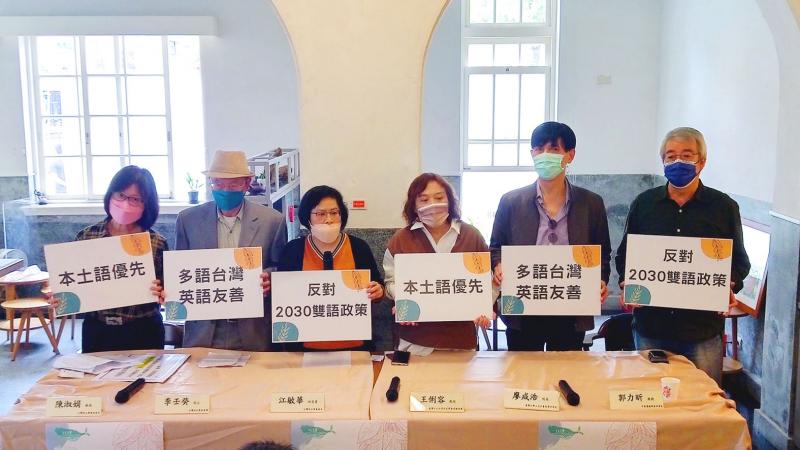Civic groups and academics yesterday requested that the government rethink its Bilingual 2030 concept and instead consider what they call multilingual, English-friendly Taiwan, prioritizing Taiwan’s native languages.
The government’s current push for Mandarin and English “bilingualism” ignores the other languages in Taiwan that make millions of Taiwanese already bilingual or multi-lingual, and overlooks Taiwan’s multiethnic population, Taiwan Languages and Literature Society director Chiang Min-hua (江敏華) said.
While the Bilingual 2030 plan would elevate English to one of Taiwan’s working languages, it could affect Taiwan’s rich language heritage and diminish Hoklo (commonly known as Taiwanese), Hakka, along with other indigenous mother tongues, as well as the Mindong dialect on Matsu Island, Chiang said at a news conference in Taipei.

Photo: Rachel Lin, Taipei Times
The ministry’s push for English instruction in math, science, music and arts elevates English above languages native to Taiwan, she said.
“The 2030 bilingual plan pushes English into a top position among the many languages spoken and used by many segments of society. It would erode Taiwan’s identity as a sovereign state, and sever people’s homeland roots,” said Chiang, a linguistics research fellow at Academia Sinica.
“Taiwan is well known for the diverse mother tongues that its people have kept alive, and this is part of these groups’ cultural heritage,” said Paul Jen-kuei Li (李壬癸), an expert on Austronesian languages.
“Our society’s most distinctive cultural features are the diverse Austronesian languages, which are in danger of disappearing. Most younger generations from indigenous communities cannot speak their mother tongues,” he said, adding that preserving and reviving these languages should be a priority.
Chiang said that a signature drive that started on Feb. 21, International Mother Language Day, has garnered about 1,700 signatures for the cause, including the names of about 400 academics and linguistic researchers, and about 400 schoolteachers.
The groups asked for support from lawmakers to review the Bilingual 2030 policy and to not approve a bill to establish a Bilingual Nation Development Center.

Taiwanese scientists have engineered plants that can capture about 50 percent more carbon dioxide and produce more than twice as many seeds as unmodified plants, a breakthrough they hope could one day help mitigate global warming and grow more food staples such as rice. If applied to major food crops, the new system could cut carbon emissions and raise yields “without additional equipment or labor costs,” Academia Sinica researcher and lead author the study Lu Kuan-jen (呂冠箴) said. Academia Sinica president James Liao (廖俊智) said that as humans emit 9.6 billion tonnes of carbon dioxide compared with the 220 billion tonnes absorbed

The Taipei Mass Rapid Transit (MRT) Wanda-Zhonghe Line is 81.7 percent complete, with public opening targeted for the end of 2027, New Taipei City Mayor Hou You-yi (侯友宜) said today. Surrounding roads are to be open to the public by the end of next year, Hou said during an inspection of construction progress. The 9.5km line, featuring nine underground stations and one depot, is expected to connect Chiang Kai-shek Memorial Hall Station to Chukuang Station in New Taipei City’s Jhonghe District (中和). All 18 tunnels for the line are complete, while the main structures of the stations and depot are mostly finished, he

Taipei is to implement widespread road closures around Taipei 101 on Friday to make way for large crowds during the Double Ten National Day celebration, the Taipei Department of Transportation said. A four-minute fireworks display is to be launched from the skyscraper, along with a performance by 500 drones flying in formation above the nearby Nanshan A21 site, starting at 10pm. Vehicle restrictions would occur in phases, they said. From 5pm to 9pm, inner lanes of Songshou Road between Taipei City Hall and Taipei 101 are to be closed, with only the outer lanes remaining open. Between 9pm and 9:40pm, the section is

China’s plan to deploy a new hypersonic ballistic missile at a Chinese People’s Liberation Army Rocket Force (PLARF) base near Taiwan likely targets US airbases and ships in the western Pacific, but it would also present new threats to Taiwan, defense experts said. The New York Times — citing a US Department of Defense report from last year on China’s military power — on Monday reported in an article titled “The missiles threatening Taiwan” that China has stockpiled 3,500 missiles, 1.5 times more than four years earlier. Although it is unclear how many of those missiles were targeting Taiwan, the newspaper reported